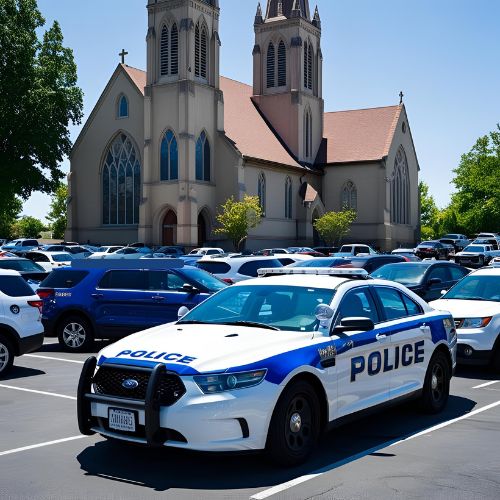The Changing Role of Off-Duty Police Work: Opportunities and Challenges
Introduction
For decades, law enforcement officers have taken on off-duty work, also known as extra duty, to provide security, traffic control, and other safety services. However, the management of off-duty employment has evolved significantly over the years, especially with the rise of professional companies dedicated to overseeing these assignments. Former Greensboro Police Chief Wayne Scott, now Vice President of Business Development at Extra Duty Solutions , provides insights into how off-duty policing has changed, the challenges it presents, and the role of specialized companies in making the process more efficient and transparent.
The History of Off-Duty Policing
 Off-duty work has been a long-standing practice in law enforcement. Traditionally, businesses and community members would informally approach officers needing security services. These requests ranged from providing security at retail stores to directing traffic at events. Over time, police departments began recognizing the need to regulate these assignments due to liability concerns and the potential for conflicts of interest.
Off-duty work has been a long-standing practice in law enforcement. Traditionally, businesses and community members would informally approach officers needing security services. These requests ranged from providing security at retail stores to directing traffic at events. Over time, police departments began recognizing the need to regulate these assignments due to liability concerns and the potential for conflicts of interest.
In the 1970s and 1980s, more departments started implementing formalized approval processes, ensuring that officers adhered to guidelines regarding where and how they could work extra duty. However, these systems often lacked centralized management, leading to inefficiencies and accountability issues.
Officers often found themselves responsible for negotiating payment terms, setting schedules, and coordinating logistics directly with employers, creating inconsistencies in compensation and working conditions. Some businesses exploited this lack of oversight, delaying payments or requiring officers to perform non-policing tasks beyond their original agreement. Without a structured system in place, these arrangements often lacked fairness, leading to frustrations among officers and concerns about professional standards.
The Role of Officers in Off-Duty Assignments
Officers working off-duty typically wear their uniforms, providing a visible law enforcement presence. This reassures businesses and the public while also acting as a deterrent to crime. The use of patrol cars varies by jurisdiction; some agencies allow officers to use department vehicles for off-duty jobs, while others charge additional fees or restrict their use.
In southern states, off-duty assignments often include the use of police vehicles, whereas northern and western agencies tend to limit vehicle availability due to fleet shortages. Officers working these assignments must balance their primary responsibilities with their extra-duty jobs, ensuring that they do not become overworked or violate department policies regarding work hours.
Aside from traditional security and traffic control, officers are sometimes hired for special events, including weddings, funerals, and religious gatherings. These situations present unique challenges, as heightened emotions and large crowds can increase the likelihood of disturbances. Law enforcement agencies have developed guidelines to ensure officers are positioned effectively in these roles while maintaining a neutral presence.
Additionally, off-duty officers often work in public venues such as concerts, sporting events, and community festivals. Their presence ensures crowd control, rapid response to emergencies, and enforcement of local ordinances. Given the increasing number of mass gatherings and public events, the demand for off-duty officers has grown considerably in recent years.
Challenges Faced by Agencies

Additionally, certain businesses and industries were often restricted from hiring off-duty officers due to ethical concerns. For example, while many departments allow officers to work traffic control for bars, most prohibit them from working inside establishments that serve alcohol. Similarly, assignments at casinos or gentlemen’s clubs are often highly regulated due to the potential for reputational risks.
Some officers have taken advantage of weak oversight by engaging in “double dipping,” where they claim to be working for their police department while simultaneously working an extra-duty job. Without clear tracking and accountability measures, such practices damage the credibility of law enforcement agencies and create conflicts of interest.
Another challenge lies in coordinating large-scale events that require multiple off-duty officers. For example, parades, music festivals, and marathons often need extensive security planning and personnel management. Without a structured approach, it becomes difficult to ensure appropriate staffing levels, leading to potential gaps in coverage and safety risks.
The Risks for Officers

Another critical issue is workers’ compensation. In some states, officers injured while working an extra-duty job may not be covered by department insurance, leaving them to rely on personal sick leave. This created a need for better management solutions to address these concerns and provide officers with financial and legal protections.
Additionally, officers may find themselves in situations where they must exercise law enforcement authority in an off-duty capacity. If an incident escalates, they may have limited departmental support and face heightened scrutiny. Some agencies have introduced additional training programs for officers who frequently work off-duty to ensure they are prepared for scenarios unique to extra-duty assignments.
Off-duty officers must also navigate jurisdictional challenges. If an officer is working in a different city or county, questions may arise regarding their authority, legal protections, and coordination with local law enforcement. Addressing these issues requires clear agreements and policies between agencies and municipalities.
The Emergence of Extra Duty Solutions

Milliman’s interest in the field began when he witnessed the difficulties in securing off-duty officers for high-profile security assignments. Understanding the inefficiencies within the system, he developed a business model that would benefit both law enforcement agencies and private employers by introducing structured, technology-driven solutions.
How Extra Duty Solutions Works

Client Communication – The company acts as a centralized contact point for businesses seeking to hire off-duty officers. They ensure that assignments align with department policies and establish clear terms of engagement.
Officer Scheduling and Assignment – Through an advanced digital platform, Extra Duty Solutions distributes assignments fairly among officers. Some agencies use a point-based system to ensure equal opportunities, while others rely on first-come, first-served methods.
Payroll and Payment Management – The company guarantees timely payment for officers, eliminating concerns about inconsistent compensation. They either pay officers directly or work through the department’s payroll system, ensuring compliance with tax and employment regulations.
Invoicing and Financial Tracking – Extra Duty Solutions handles billing and financial management, streamlining the payment process for businesses and ensuring that agencies do not have to chase down unpaid invoices.
Additionally, the company provides liability insurance and, in some cases, workers’ compensation coverage, addressing a major concern for officers working off-duty jobs.
The Impact on Law Enforcement Agencies
Agencies that partner with Extra Duty Solutions benefit from increased transparency and accountability in their off-duty programs. The company’s tracking and reporting tools allow departments to monitor assignments in real time, reducing instances of double-dipping. By implementing professional oversight, agencies minimize the risks associated with mismanagement, liability claims, and unauthorized work arrangements.
Furthermore, Extra Duty Solutions relieves law enforcement administrators from the burden of managing off-duty employment internally. This allows departments to focus on their core responsibilities without diverting resources to administrative tasks.
For the agencies and their officers, there is no costs for using Extra Duty Solutions. The administrative fees for Extra Duty Solutions are paid for entirely by the businesses and organizations using their services.
The Future of Off-Duty Law Enforcement Work
As the demand for off-duty officers continues to grow, professional management solutions are likely to become even more essential. Many law enforcement agencies are recognizing the value of outsourcing administrative functions to specialized companies that can provide efficiency, fairness, and financial security.
The increased oversight and structured processes introduced by Extra Duty Solutions and similar companies contribute to the professionalization of off-duty policing. As more agencies adopt these systems, they create a safer, more accountable, and more sustainable model for extra-duty employment.

